Maltese evolves to reflect the ruling class
Published:
September 26, 2013 at 3:51pm
Why ‘kowt’ but then ‘boiler suit’?
Why ‘maggijiet’ (mugs) when EVERYONE who uses that word pronounces it ‘makkijiet’ and ‘makk’?
If you’re going to drop the English spelling, drop it altogether to reflect pronunciation, or just ruddy well keep English words intact as the Italians do, regardless of how they pronounce them.
Incidentally, why are ‘maggijiet’ and ‘tepot’ (TEPOT!) illustrated with a Chinese, rather than English, teapot and the equivalent matching Chinese tea-tumblers, rather than actual mugs with handles?
93 Comments Comment
Leave a Comment

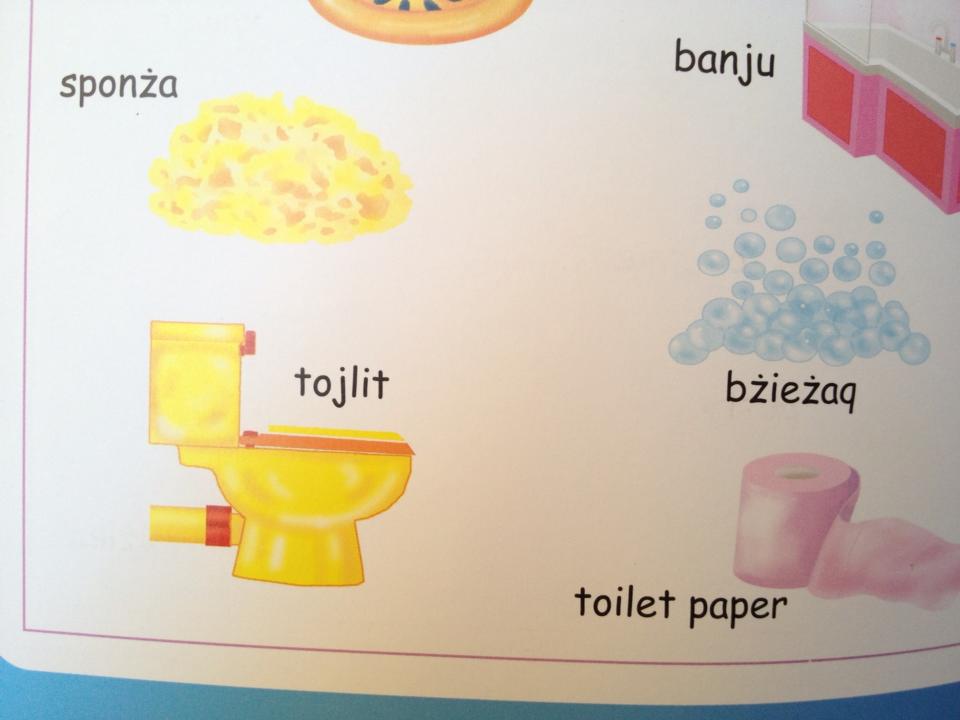
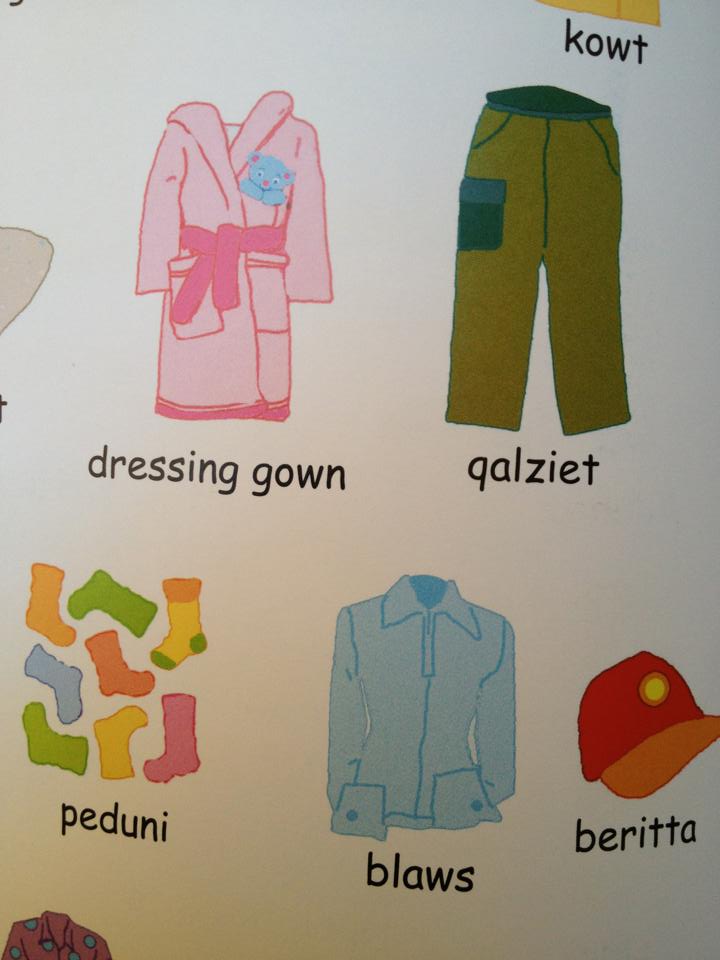
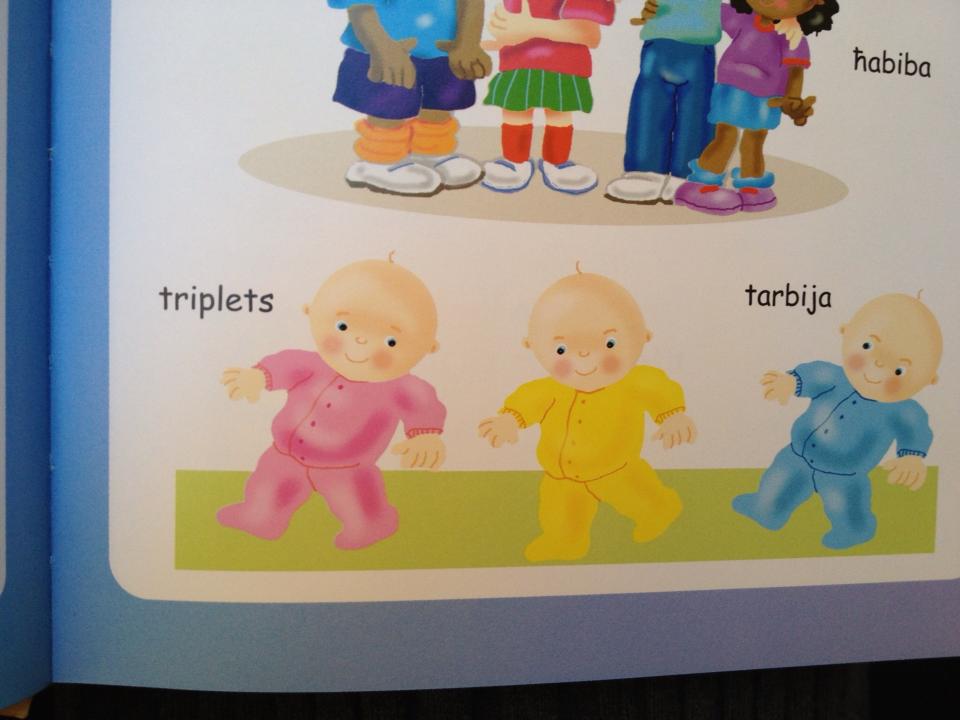

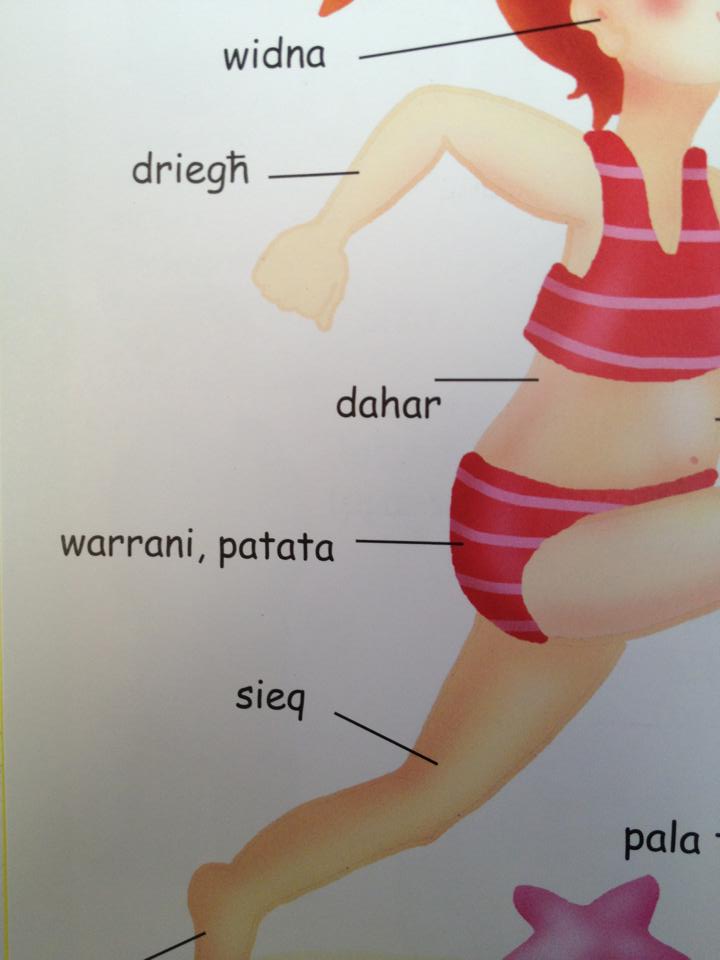
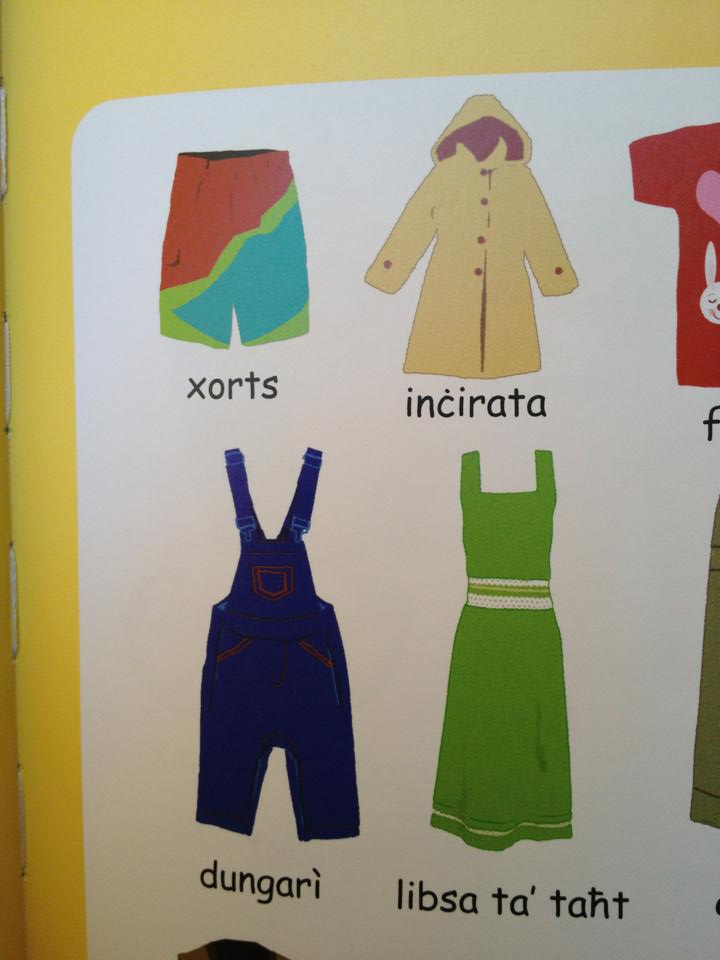
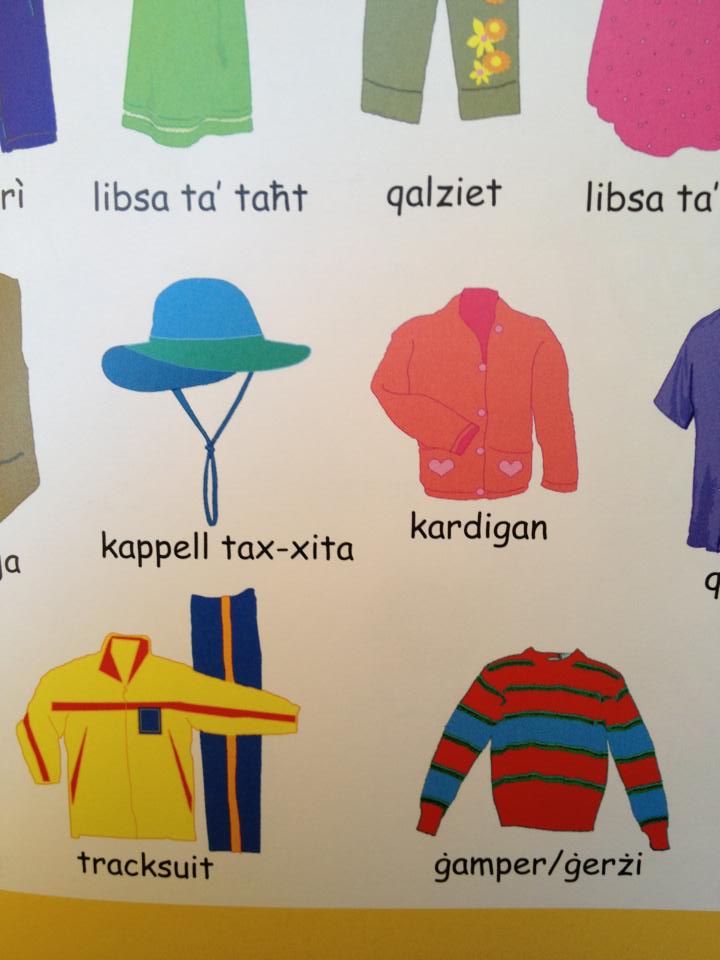




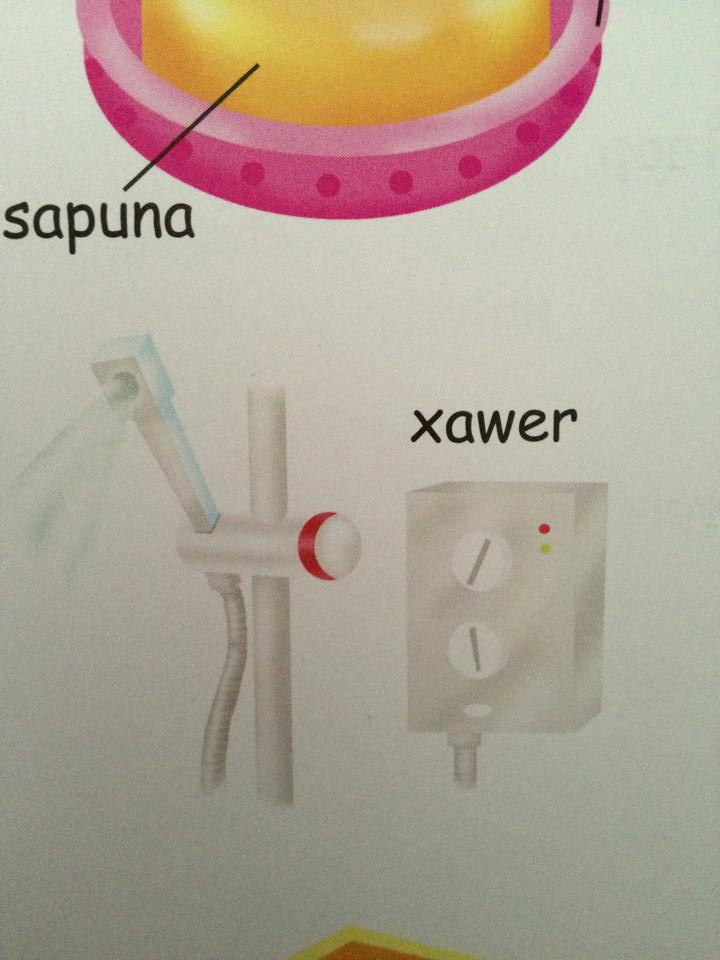
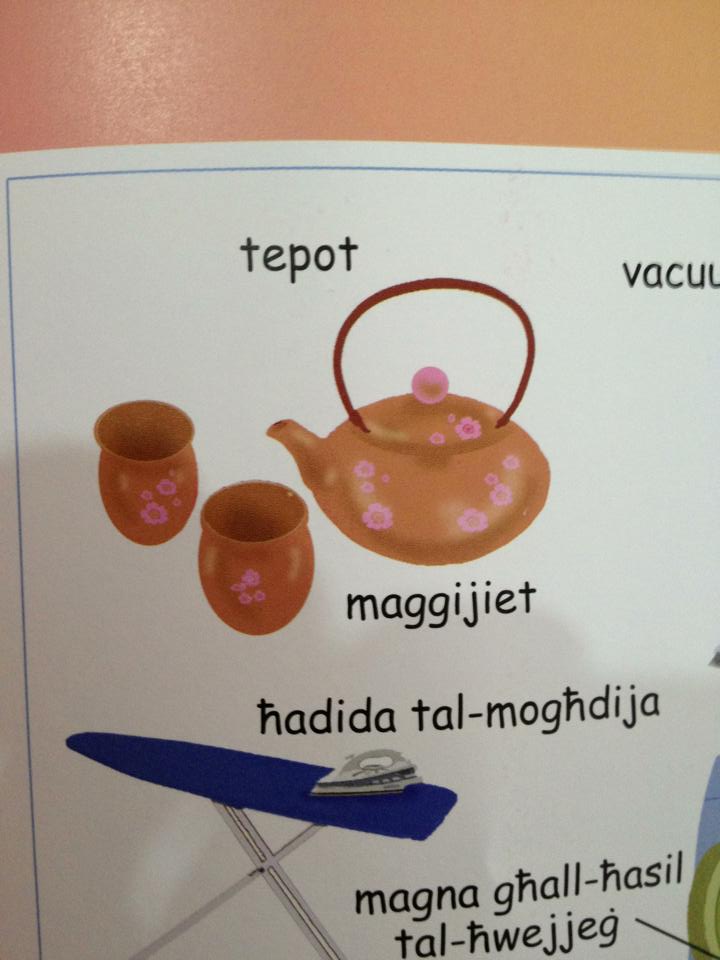
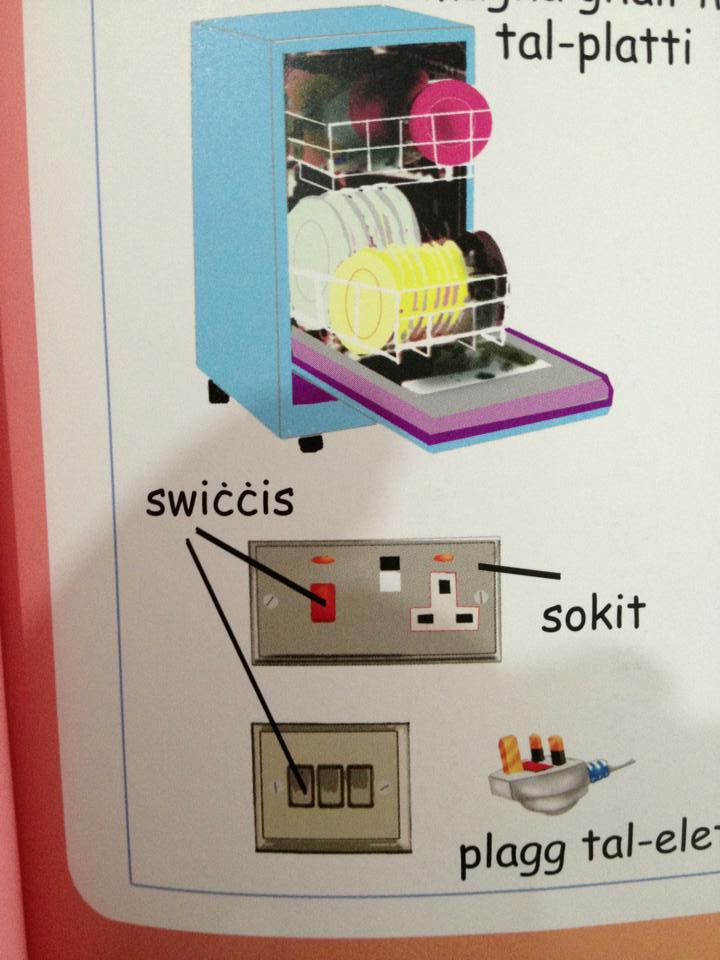
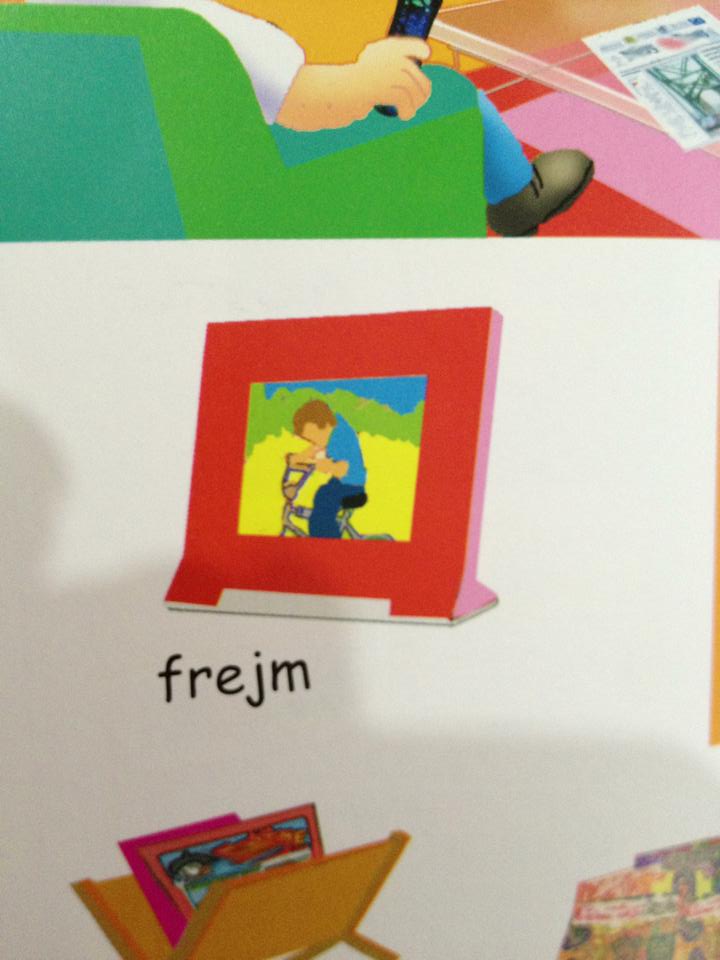
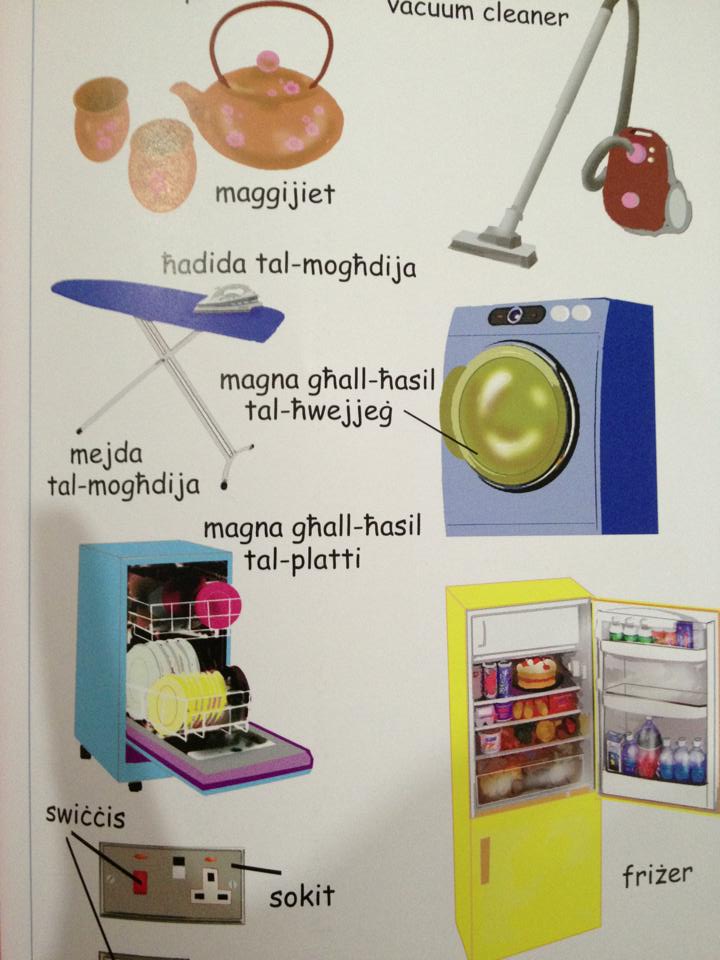
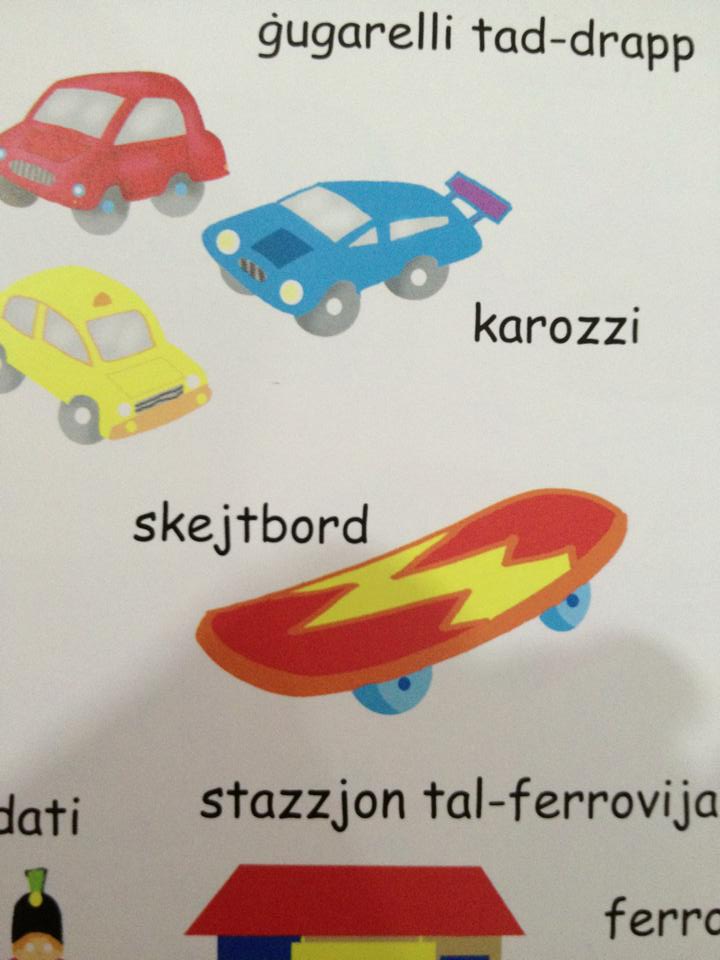
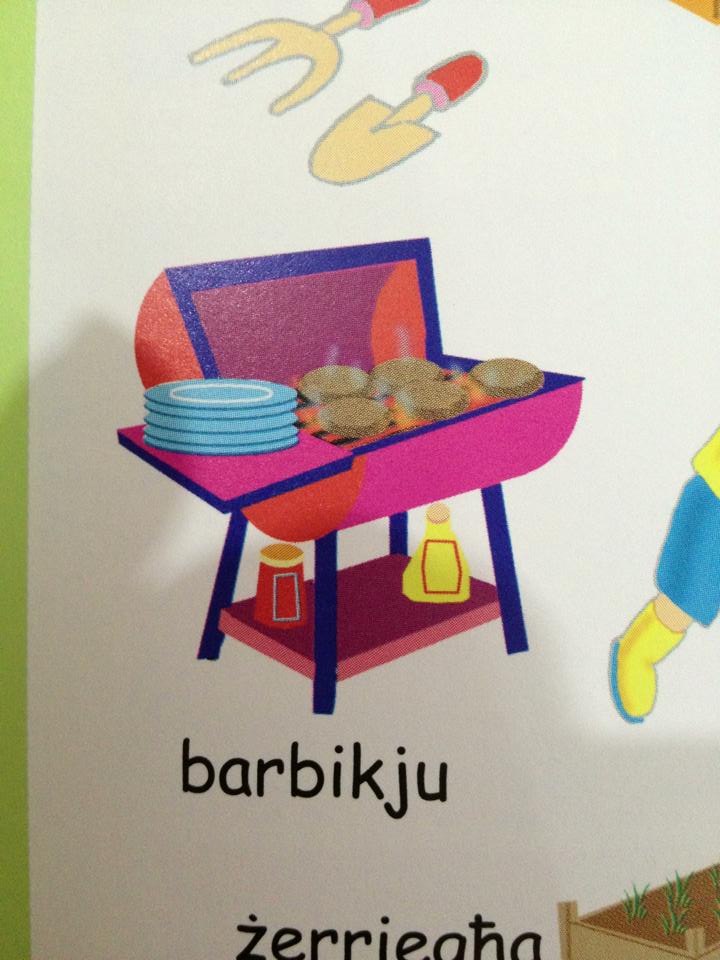
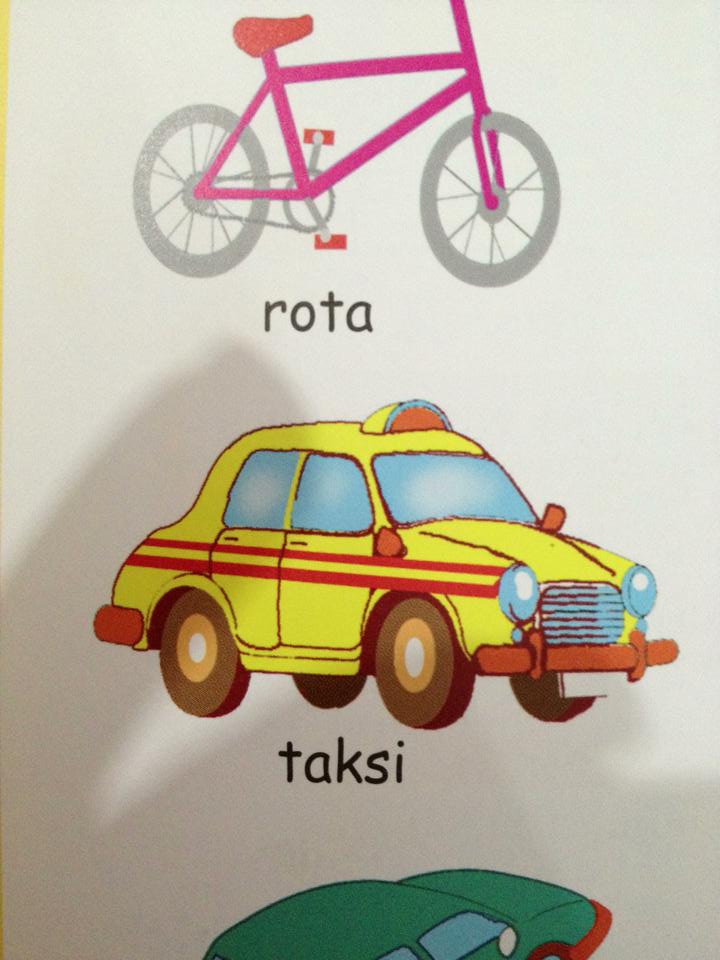
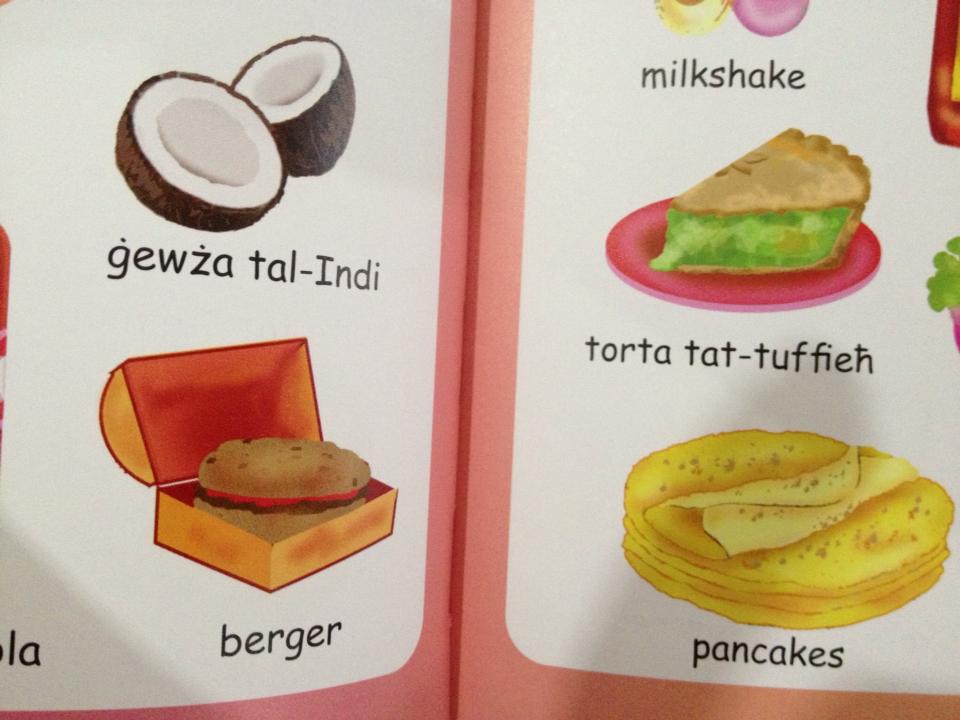
Oh please. This is linguistic vandalism. It seems like there’s no agreement whether to stick to English words and English spelling, or to find Maltese words and spelling. So at the moment it’s a free for all.
What a disaster! This kind of incompetence coming from people who should know better really baffles me.
So, on the same page, we have toilet and tojlit. make up your mind, guys, because you have ruined a language.
They have create a new language totally alien to Maltese.
Fi zmienna konna nsejhulu “loki”.
Why ‘tojlit’ and ‘toilet paper’ ?
Possibbi li xi gharef tal-lingwa Maltija ghadu ma ndunax li ‘milkshake’ ghandha tinbidel ghal ‘milkxejk’?
Frejm? Why not ‘inkwadru’?
[Daphne – Possibly because the former is the corruption of an English word while the latter is the corruption of an Italian word, and both are now Maltese words, for our sins.]
If anything it would be ‘gwarniċ’ which has existed in Maltese for generations.
Allura ghax mhux kollox? bhal tojlit pejper; dresing gown, triplits, bojlersjut, treksjut, skranci, vakumkliner, penkejk, Probabilment ma ghamluhomx ghax indunaw kemm jigu tan-nejk (sorry).
I think you’ll find that “gawn” in Malti is more likely to be pronounced like “gown” in English, pm.
I saw this circulating on Facebook a couple of days ago.
The Akkademja tal-Malti should honestly just have the guts to say that if a word in Maltese does not exist, then the English/Italian/whatever language word should be used in its original form, and the said word is placed in inverted commas.
But that wouldn’t be promoting ‘Brand Malta’ now, would it. Bastardising the language, on the other hand, sure is.
In today’s globalised word, EVERY language has to bastardise itself if that language’s users want to be open to what happens outside their cocoon.
The Akkademja tal-Malti has an impossible task of standardising Maltese. If it takes a logical route, people would complain that Maltese is going against the tide of common usage, and if it goes the common usage route, people would complain that it’s bastardising the language.
Taking the aobve pics to base arguments on is tantamount to clutching at straws. It would be more accurate to say that this book has had totally incompetent editing, and that it should never have seen the light of day, given that these books are the root of tomorrow’s Maltese.
Jeffrey Pullicino Orlando will be disappointed to see that we’re Turks, after all. Taxis in Istanbul are labelled Taksi.
It looks like some third rate publication to me. I advise parents to look well into books of this sort, to check out contents well and maybe even check out the credentials of the authors. There are many good publications but also a lot of trash such as this around – for example the choice of spelling rules, the illustrations etc. leave a lot to be desired in this sample. I’d never choose it for my kids.
[Daphne – It’s an actual school textbook.]
@Daphne
You are joking, right?
[Daphne – No.]
“tojlit” is accepted but then it’s “toilet paper” as opposed to “tojlit pejper”.
Exactly! Noticed that too. At least maintain a standard if we’re going down that road.
Even more baffling – why ‘tojlit’ but then ‘toilet paper’.
This looks like it was thrown together to make a quick buck, rather than to as a genuine educational tool.
I could have sworn there were Maltese words for these things.
What the hAck is a kappell tax-xita? Seems like with this book the translation situation at the European Parliament will be solved.
It looks quite archaic, what with a petticoat and a rain-hat.
If we are going to use non-Maltese words with colloquial Maltese, we should stick with the foreign spelling and pronunciation.
Has the Akkademja ever come out with a valid and sensible explanation for the butchering of foreign words so as to sanitise them for use in spoken/written Maltese?
I agree with you we should have gone the Italian way.
Please, oh please, let’s drop that anachronism “mitjar” (who does still use it anyway ?) and use “airport” once and for all.
yes l-Akkademja has a valid reason. let’s take the word ‘coach’, this has now become a Maltese word. Now you are suggesting we stick to the foreign spelling which is fair enough BUT then when everyone is using the word ‘jikkowċja’ are you suggesting we write jicoachja??? or perhaps niskateja (skating) or nissurfja ?? so how is the Akkademja supposed to tackle this? Its easy to attack. This is a language and like all languages it is evolving guys. It is the people in the street that change the language. The publication of this book surely is not helping, it is inconsistent and full of mistakes. I hope it will soon be withdrawn from schools.
http://www.timesofmalta.com/articles/view/20130926/local/former-commissioner-says-he-had-wanted-to-arraign-john-dalli.487849
Ouch !
Who is inventing these words? Not good as phonetic English let alone as Maltese language. The inconsistency is unbelievable; like toilet and toilet paper.
What rule is there that says that adopted words have to sound as in the original language?
Not even English does that.
Why do people always single out Maltese as the language that is breaking all the “rules”, when in fact there is hardly any language, if at all, that has hard and fast rules about spelling, grammar, and pronunciation?
THIS is what baffles me, not the pics above.
Whoever drew up this sorry excuse for a dictionary doesn’t have the foggiest idea of Maltese phonics or phonetics. A very clear example is the word dungari: U never has an A sound in Maltese.
Parents pls beware. Even though it’s been published, it doesn’t qualify automatically as good.
Schools are aware (reference made to private schools)… but the excuse is… “that’s what’s supplied.” As a parent one may grumble… but after years of grumbling it’s only gotten worse and these type of words have disappointingly only become increasingly entrenched, for some.
There’s a perfectly valid person at University, of solid, genuine grounding in Maltese, whose job it is to create new words in Maltese. Last time I spoke with him about the matter, which is some years back, he was in despair at the attitude and level adopted by the press.
His work and research are valuable and the results harmonious to a development of Maltese I would respect, but “the press are in a hurry to rush in with new words”: that was his cautious complaint.
Perhaps there could be some process by which new words are formally accepted into Maltese. The French resisted the English word “computer” when it entered mainstream vocabulary, and “ordinateur” is today the only word commonly used.
Italian, English and Arabic are not the only roots from which new words in Maltese should be sculpted.
Thank you, Daphne, for highlighting the issue in this way.
The problem with phonetic spelling is that people pronounce words in many different ways so it’s difficult to find a spelling that fits them all.
For example, if we really want to spell the words as they’re pronounced in Malta, it should be ‘tipot’ not ‘tepot’, ‘tripliz’ not ‘triplets’ and ‘dangaris’ not ‘dungari’.
And nobody, but nobody, calls a dishwasher ‘magna għall-ħasil tal-platti’,
That’s an attempt at being accurate about the meaning (magna għall-ħasil tal-platti), which makes matters worse. Not because nobody uses, but because there’s simply no need for it.
As long as the coined word conveys the right meaning, preferably without having to borrow from the context, it should suffice.
Take the words “washing machine”, for example. Nobody doubts what this machine is meant to be washing, even though there’s no hint anywhere. The “funny” thing is that a washing machine is meant to wash clothes to produce what is known as the “washing”. If there was any logic in the coining of English words, this should have been a “clotheswasher”, which “dishwasher” duly observes.
It is for this reason that I don’t see the need to be literal when trying to come up with a Maltese word for an adopted word from whatever language, which happens to be English in probably almost all cases nowadays.
There’s no reason why dishwasher couldn’t be “magna tal-platti”. “Ħasil” would be the obvious implication here. Adopting “ħassiela” for washer would be seen as extreme by many, I’m sure, so I would doubt that “ħassiela tal-platti” would go down well.
Arguments for and against ANY method are endless. I personally prefer strict Maltese spelling if we are to keep to the original pronunciation, and reasonable phrases if we are to translate.
“Magni għall-ħasil tal-platti” for dishwasher is certainly not reasonable, to my mind, just as “trażmissjoni tal-istampa mingħajr fili” wasn’t when they had tried it for television back in the 70s.
Wouldn’t it be wonderful if Maltese had to develop and rejuvenate by being “reasonable” as you state, but not necessarily as literal as it has become?
Buz tax-xita? Why not buwts allura? What the hell is this crap? Keep English words intact. This is hideous.
It’s all well and good to insist on keeping English words intact, but which “English” words are we talking about? ALL words used in the English language? Or just the words that are uniquely English and not adopted from another language?
For if the latter, then why insist, in the first place, when English itself DOES NOT keep the adopted words intact in MANY instances?
You see, English is no virgin language, and it breaks EVERY single rule that all and sundry have been hurling at Maltese since its very inception.
Rest assured that within the next 25 years there will be hardly any Maltese people who speak either English or Maltese at this rate.
Of course those Socialists will send their children to schools abroad.
Language changes to reflect the evolving identity of a nation.
It certainly does.
What a mess.
Now I know why never learning the lingo has really held me back.
The children’s Maltese encyclopedia – translated and published by Merlin Library – was a great source of entertainment for my children when they were younger. The diagram of the human body had a wonderful ‘word’ for shit/excreta: “tojlit”.
Incidentally, the scans you provided above were made from a Junior 2 book used by an independent/private (not Church and not government) school.
Having said that, it’s a relief to see “magna tal-hasil tal-hwejjeq”, rather than the “woxxin mexin” my nephews had some two decades ago.
And what about the infamous “blu bejbi”?
This is absolutely crazy logic.
If coat is translated to “kowt,” then why boots translates to “buz” not “buwz?” And what happens when we need to refer to one boot? Will it become “zarbuna tal-buz?”
We have “toljlit” and soon we will have “pejper,” but together they make “toilet paper.”
Also they should have gone all the way and named the grill a “barbikjun” as the majority already call it.
Coming up next:
Pirmli, Sinku, Irkotta, Ghajfown, Bejb –
[Daphne – Or the police commissioner’s very own ‘skanetru’ (skeletru).]
Don’t forget the infamous “sliper” (for tennis shoes).
What about: sangwic, petlor, kolslow?
Incidentally, I saw this spelling in a comment on timesofmalta: Mater Day.
I am really dreading my child starting school and having to learn this crap. How on earth will I ever explain and teach her the correct spelling?
I don’t think you should be too concerned about that.
Children have no problem learning to write “tojlit” when writing Maltese, and “toilet” when they’re writing English. They see them as two distinct languages as they’re meant to be.
I’d be more concerned about the lack of backing that the Akkademja has by the very same people that it’s working for.
The “w” sound is implied in many Maltese words. As an example, we write “trux”, not “truwx”. And that’s not some “bastardised” version of some adopted word.
Don’t try to impose logic on language. There’s no such thing, in any language, at least not the kind of consistent logic that you’re trying to impose here.
If you want a word for a boot, then you can have “buza”, but something tells me you’ll have more than a mere something to say about that. If you want some logic for using “buza”, then consider “bieb” and “bieba”, again not particularly bastardised.
You see, there’s no possible way for the people concerned with formulating the Maltese language to make people happy about their work. When they suggest a Maltese equivalent which would lend itself well to the Maltese rules of spelling and grammar, people decry them and insist that they should adopt the word from the original language intact, and these words were never intended for Maltese grammar in the first place, but then these same people ask “and now what do we do for a single …”.
So to extend the argument further, I suppose you’d insist that we write “boots”, and the “boot”. Well, in that case, why bother with Maltese at all? Let’s just obliterate it, and we’ll all speak and write in English, Italian, German, French, or whatever, as long as it is not Maltese, the only bastardised language of the lot.
Or maybe not.
So whichever way the Akkademja goes, it’s going to get the proverbial “buz” up its behind.
Not a comfortable job, this Akkademja business, is it?
And the plural of swicc becomes swiccis.
Tahwid kbir.
How depressing! This country is going to the dogs at such a fast rate. What a shame!
F*#k whatever the Akkademja says or pontificates, I shall go the sensible way and spell/pronounce/use foreign words in the original version and not in some bastardized pseudo Maltese version.
I had that principle with my children and made them practise it until they were penalised for it by their teachers.
These words are being introduced officially into the Maltese language and must be spelt and used that way.
Careful, there.
You’d be hard pressed not to use bastardised pseudo English versions of German, French, Italian and what-have-you words every time you speak or write in English.
[Daphne – Yes, dating back to the days when the vast majority of people were illiterate. Post-literacy, loan words are incorporated intact, as English words are into Italian. And that figures – Malta has not yet reached that stage of literacy. ]
In the days of illiteracy, language architects had an easier job because they had almost absolute control of the written word. And yet they still chose to transliterate adopted words.
But I guess the word literacy takes on a whole new meaning in modern times. It looks more like chaos than literacy to me.
Take the languages that do not use the Latin alphabet. They obviously need to transliterate adopted words. Should we be calling these people illiterate because they have no way of adopting European words “intact”? At what stage of literacy would you say these people are, then?
Dressing gown? Shouldn’t that be dressing gawn?
And the winner goes to gersi / gerzi – 2 versions of the same word.
I thought Berger was a paint rather than a fast food.
And you’ve just got to love the way it’s presented in a lunchbox.
Why don’t the experts at Akkademja tal-Malti borrow from Arabic rather than English or Italian? Surely, there is an Arabic word for toilet and that word would be the only logical choice for a Semitic language.
Tfixkilhomx msieken. Donnu qas Kalepin ma jafu x’inhu.
You mean an Arabic/Oriental style “hole in the floor” squat toilet or a European style “sit down toilet” that are used in Malta and Gozo?
It’s not the Akkademja which borrows words, it’s the Maltese. These are all words commonly used every day. The issue is how to spell them.
Have these silly words been originated / given the approval of the University’s Faculty of Maltese? If this is the case, then we really have professuri tal-bigilla.
Eksellent, bravi! Now try and have a go at writing a paper of a scientific/artistic nature in Maltese…
Yes, does a language this painful even allow hermeneutics?
Onto ideological pragmatism then, only as insipid to counteract the resulting for cacophonic harshness.
It’s so poisonous, the author couldn’t even finish it.
And don’t tell me this isn’t pure unadulterated Mintoffianism. Vile and destructive.
Simon note. It’s essential to challenge that which is rotting.
Gewza tal-indi? What’s that – a “kowkonat”?
No. It’s Kurt Farrugia.
The English language has no accents by one still writes “tête-à-tête” in English, complete with an ‘accent grave’ and no less than two ‘accents circumflex’, just as it is written in its original language – French – from where it is borrowed. But then English is only spoken in insignificant places like the US, Canada, UK, Australia and another 50 odd countries.
The wisdom of respecting the spelling of the source language becomes evident when one tries to reproduce sounds from the source language that do not exist in the borrowing language. The iconic example in Maltese is “televixin” which does not reproduce even the Maltese pronunciation of the original word.
Yes indeed, the presumptuousness of trying to reproduce the orthography of borrowed words based on the rules of the borrowing language can be as humiliating as that.
Well you must now stop poking fun at Mishaaaal’s mispronunciation. Hendbeg, gingerbretmen,selit are officially Maltese words and therefore pronounced the right way. Quick fix.
This has been going on for ages, and it’s disgusting. I can’t begin to imagine what the people who agreed on this were thinking (if they were).
I hate to tell you I told you so but I told you so.
It’s just so painful to look at! Not to mention the fact that it’s also encouraging wrong pronunciation…”hendbeg”…seriously.
[Daphne – And ‘hendbeg’ is wrong in terms of pronunciation too, because Maltese doesn’t know the final hard G sound, which ALWAYS, in those who grew up speaking only Maltese, becomes a K sound: hendbekk, makk, and so on. When, later on in life, they learn some English, this problem is carried into the new language, for the basic reason that it is practically impossible to learn new verbal sounds in adulthood. And so we get ‘beink’, ‘seyink’, sailink’, ‘put it in de bekk (bag)’ and similar.]
If we could just use English words and give them a Maltese spin, I’d have had a much easier time at O’level, back in the day.
tojlit = loki
toilet paper = karta tal-loki
kowt = libsa ta’ fuq
dressing gown = libsa tad-dar
blaws = qmis tan-nisa
triplets = tliet tewmin
hendbeg = basket tal-idejn
xorts = qalziet qasir
gamper / gersi = flokk tas-suf
xawer = docca
tepot = kitla tal-te
It’s not so difficult really….
The Maltese language had long been fudged beyond existence by these wannabe prats who have turned spelling into a joke rather than an attempt at proper orthography.
National and cultural identity apart, there is really no point in studying this language any more. Yet the powers that be still ram this language down everyone’s throat. Do not get me wrong, for I got top grades in Maltese (in form 2 and beyond).
That was however before the language become a bastardised form of misspelt Minglish! Vassalli and many others must really be turning in their graves.
It is amazing of how many English words we use in the Maltese language, corrupted or not.
I don’t know where the illustrations come from. The spelling does not conform to the present rules of Maltese orthography as has been observed by several contributors above. The rule is that all so-called “loan-words” (I personally do not agree with this term) are to be written phonetically. This, as everyone knows, results in some rather strange-looking words like “woxingmaxin”. This rule is not peculiar to Maltese – strike in Polish is “strajk”.
I personally say “magg” not “makk” but these are regarded as variants. Malta is, in my opinion, a special case where it concerns the phonetic writing of English words. In a milieu where English is just a foreign language, phonetic spelling might not jar so much but in an environment where English is ubiquitous, such as Malta, phonetically-written English words look strange because one constantly sees them written in the English manner and the phonetic one at the same time. My opinion is that, because of what I have already stated and because it seems there is resistance to phonetic orthography of English words, the rule should be that where the English word has not sustained considerable change (e.g. kitla, skrun, etc) English words should be written in the original English spelling. This would do away with the confusion in children’s minds as to which is the correct spelling.
The problem does not occur in the case of words of Italian origin because of the phonetic affinity between Italian and Maltese.
In my opinion, orthographic rules in Malta are made by academics who live in the Tal-Qroqq fortress and have no feel for what people think. If strict phonetic spelling is being resisted, then the worst one can do in matters of language is impose.
Incidentally, I have seen English words containing a double consonant spelt phonetically in Maltese with a double consonant. Few seem to know that, though English has many words spelt with a double consonant, in English pronunciation a double consonant is unknown — it is always pronounced as a single consonant. That is why Italians sound so strange when they say “kil-ler” because they try to pronounce both middle phonemes as if the word were Italian. Many Maltese make the same mistake and say “dif-ficult”, “recom-mend”, “dis-sident” etc. Enough for today.
I agree entirely.
I would add that English is also full of words imported from other languages, especially Norwegian and the Romance languages. Not only that, but the imports that have not undergone considerable change are written using the original spelling of the donor language, e.g. “education”, “notification” and the classic example “yacht” (from early Dutch).
I am no linguist, but in my opinion English is all the richer for it.
Mhux hekk? ktieb iehor ghall-bejh. Tghid indahhluh fis-syllabus wkoll sabiex jinbieh bil-fors ! Anke certi awturi jridu jghixu.
It is currently used in Junior 2 in a private – non-Church, non-governmental – school.
Kull lingwa, tieħu u tikkorrompi u ssir parti mil-lingwa. Hekk ti-Taljan, beef steak issir bistecca, fl-Ingliż mill-Għarbi, ix-xaħ mat issir checkmate fiċ-ċess, il-licht Ġermaniża ssir light bl-Ingliż, fil-Malti l-istess, minn bon soir ħloqna bonswa, minn Chico fl-Ispanjol, ħloqna ċkejken. id-diminuttiv semitiku ma’ kelma Spanjola, u l-Ispanjoli jieħdu l-kelma mojada mill-Għarbi (pillow) u xi ngħidu għal mattress li ġejja mill-Għarbi mitraħ. L-Għarab ħadu minn sacco fit-Taljan (basket) u jgħidu saccuwat fil-plural, bħalma aħna mill-Ingliż ngħidu basktijiet, swiċċijiet, mit-Taljna/Sqalli ngħidu siġġijiet, eżamijiet u hekk tinħoloq lingwa għal rasha. Mill-kelma Għarbija marsa (creek), l-Franċiżi joħolqu Marseille, u aħna Marsaxlokk, Marsaskala, Marsalforn u oħrajna. Din rikkezza li turi l-lingwi bla fruntieri, u ħadd barrani ma jitkaża, imma jgħożż ilsienu bi kburija liema bħala. Għax kull kelma tgħid storja u tirrifletti l-istorja u l-Ġeografija.
oh God it should read skrunci, punkajks tijpot not tepot, gumper not gamper utterly ridiculous.. oh and parkett, succel, huversuk, Why not use nar for a fire instaed it is fajer, wajer, fajeringin
I’m no expert on etymology, but I’d love a form of Maltese that brings about a bit of awe and wonder. ‘Nar’ in Turkish means ‘pomegranate.’ In my mind, when I hear that, I think of what is said in Malta: that the pomegranate matures when the first strikes of lightening occur in the late summer/ early autumn. Every time I use the word ‘nar,’ the association comes to mind.
In Gozo, I’ve heard: “Ejja farka fejna” in the place of the Maltese practice “Ejja naqra hdejna”. In old Gozitan I’ve heard “Oqghod baxx (pronounced okod baxx),” for sit down, and “Ghandi ghuma (pronounced with a hard h huma, I’ve been told it was originally an “gh”)” for I’m feeling hot. These have all but disappeared today. All well and good, but would we recognise the last expression if we heard it? I’m of the opinion that we should be able to, that such old style variations should be exposed. Besides pirmli and pinuri as different developments, there is also “l-istanjata” for kettle. I’ve rarely heard the word toast in Gozo, but instead “hobz mixwi.”
In Lebanon, I’ve heard: “qieghed inhossni qisni sqaqi”: pure ‘Gozitan,’ from a local perspective. We’re not as different as we may have a right to think we are, even though in practice and development we should, perhaps, be centuries apart.
A language should also be about being able to choose words for aesthetical purposes. What is there that is aesthetic about these new flat inclusions? It does not mean, to me, that because in English there is the word “washing machine” or “toilet paper” we need to translate literally. In fact, the way it’s currently being written or ‘translated’ makes it seem like a language for dimwits.
The way forward that I perceive, is an ability to look for the concept and action and play with that with a root that makes sense to us. Otherwise how are we going to have a modern Maltese that thinks its way through and develops registers? Or perhaps registers are already in place through choice of vocabulary and that’s what divides us today more fundamentally than we could imagine. It would be a case of adopting a completely different approach too, with the switch of the ‘registers’ at our disposition.
Where is “woxxink” going to get us? to “woxxjatura?” same as “puxxjatura?” How are we going to adopt these new words poetically? Isn’t that a bit of a lazy approach? I shudder to think what tomorrow’s poet laureate, or equivalent, will propose. Don’t we have a root and verb for “to wash”? What do we go to for “pushy” in the same word family? “puxi?” “li jippuxxja?” I am not impressed. Where is the emphasis on the word family? Perhaps it may seem boring and logical to some, but academics do need to think further and perhaps include in their qualifications and research a broader exposure to the etymological structures of other languages over the years.
It is not enough, to have to make do with adopting a word into the language simply because it’s used on the streets and reinforced by the press.
Making do is lazy.
This is to guarantee that future generations would not be able to spell correctly in either English or Maltese.
Who wrote and published this mess?
best of all “warrani/patata”
Kont attendejt laqgha tal-Akkademja tal-Malti u spjegaw li “IL-LINGWA HIJA HAJJA …. allura dawk il-kliem li juzaw in-nies ghandom isiru parti mill lingwa!”
Kienu iddikjaraw li lkliem CHOICE bil-Malti ssir XELTA (meta ghandna GHAZLA) u ashtray issir EXTREJ, fost ohrajn.
Niftakar li kont ssuggerejt, biex nitmejjel u nipprova nwaqqalhom l-argument, li VACUUM CLEANER issir HOOVER u l-verb VACUUM CLEANING isir TIHHOOVERJA ghax dawk juza L-POPLU, u qaluli “MA TARAX!” It-Taljani jghidu sew “CHI COMANDA FA’ LA LEGGE” u ahna l-Maltin BIR-RAGUN nghidu “HAWWADNI HA NIFHMEK”.
Kissirniha lingwa. XEJM ON JU.
How can such things make it to print? Sometimes I shudder to the notion of having to raise kids in this country…
How about baslejn? I thought this meant two onions before I realised what it was.
Hi Daphne your blog is our sunshine on a rainy day. These words really hurt my eyes and ears. I refuse to read, write and teach these words to my kids. By any chance did you get them from l-Orizzont?
[Daphne – No, from a schoolbook for teaching Maltese.]
The Akademja tal-Malti are a bunch of glorified twerps who are making sure the Maltese language dies in a few generations.
And not a moment too soon.
Good riddance to a pidgin language that is half the reason for our backwardness.
Oh and about that flag, I’m all for changing it. Here’s my suggestion:
http://www.flyingcolours.org/uploads/product_imgs/5ce3d4d474.png
My sister’s kid has it as a textbook.
Xi argumenti ma jreġux. Il-lingwa tirrifletti l-qagħda ġeografika u l-istorja. Hemm ukoll ħafna psikoloġija fiha. Bl-istess argumenti, l-Ingliż, meta ssellef eluf ta’ kliem, biex jinqeda fix-xjenza u dixxiplini oħra, messu ħalla l-kelma kif kienet.
Hekk, mill-Grieg, Bios Logos (biology), u bħalha, philosophy, Theology, psychology u tant oħrajn.
Meta l-Ingliż, issellef mill-Ġermaniż, biddilhom ukoll għal ilsienu, u ħadd ma jiskrupla. Dan żvilupp li jsir f’kull lingwa. Jekk wieħed imur fuq dizzjunarju tajjeb, jara l-etimoloġija tal-kelma u jara dan li qed ngħid. Kieku l-Ingliż, kellu jħaddan il-puriżmu, jispiċċa b’xejn.
Dan jgħodd għal-lingwi kollha. Sal-lum, l-Ingliżi, qed ikollhom influss qawwi, ta’ kliem ġdid, li ġej bis-saħħa tat-tagħmir elettroniku. L-istess mowbajl, qiegħed joħloq taqsiriet li llum qed isiru parti mil-lingwaġġ tan-nies. Dan minħabba l-fatt li messaġġ, jirrikjedi li jkun fil-qosor. B’dan mhu qed nagħmlu xejn ġdid. Morru fl-arkivji tal-Kavallieri u ssibu dawn it-taqsiriet, fosthom, minflok ‘dicembre’, jiktbu Xbre fil-kontijiet tagħhom. Kien hemm raġuni, kemm għax il-karta kienet skarsa u l-linka għolja. Anke għall-konvenjenza, billi dak iż-żmien riedu jiktbu kollox.
Bl-istess argumenti li taqra hawn fuq, immorru għall-argument tal-bandiera, ikollna nneħħu l-aħmar għax tawhulna n-Normanni, is-salib tar-re Ġorġ, għax tawhulna l-Ingliżi u nispiċċaw bandiera bajda…..u vera nkunu ċedejna mbagħad. Dawn x’argumenti huma, x’disprezz lejn dak kollu li hu tagħna.
Irrid ngħid li meta jinkitbu kummenti bil-Malti, dawn kollha żbalji, (mhux qed ngħid għal dawk l-iżbalji sarkastiċi), imma meta niktbu bl-Ingliż, ara ma nagħmlux xi żball. Il-lingwa tirrifletti d-dinja ta’ barra, dan hu fatt….l-istat tal-Malti llum, jirrifletti poplu traskurat, li jibża’ mill-identita’ tiegħu, anke jekk għandu 7000 sena storja, poplu li jogħxa jsawwat lilu nnifsu. Allura din hija qagħda psikoloġika xejn sabiħa.
Li kelli nġib aktar argumenti u eżempji ta’ lingwi oħra, biex nuri li dan isir f’kull lingwa, ma nispiċċa qatt. Irrid ngħid li jiena nikteb bil-Malti, għax nemmen li mal-Maltin nikkomunika bil-Malti. Sadanittant jien ngħix u naħdem, f’ambjent li fih dejjem ikolli nuża l-Ingliż, Taljan jew il-ftit Franċiż li naf. Għalhekk inħossni kburi li dan id-daqxejn ta’ pajjiż, għandu lingwa b’elf sena storja, li dejjem qajmet interess u diskussjoni…..u dan almenu pożittiv, għax sinjal li l-Malti għadu ħaj. Ħadd ma jargumenta fuq il-katavri.
Saħħiet
My grandparents who were Gozitan farmers living in circumstances that had not changed for centuries spoke a richer blend of Maltese (in dialect of course). Their Maltese was descriptive and technical.
Language evolves and because it is a tool which we use constantly, the mechanism of this tool is effectively reflecting the person who is using it and their frame of mind.
If we are simply simplifying the language with short cuts that as you pointed out, have no structure and no rules, it is also a reflection of what the Maltese personality is becoming. This is so much more evidence of this in more than use of our language.
What is more confusing in my mind is that on one hand, we have to accept it cause our island is simply a rock with a unique language that really is irrelevant. On the other hand though, the simple pride of being Maltese comes with a duty to fight for the protection of Malta and everything Maltese.
http://www.youtube.com/watch?v=9ZYuanofpVU
This piece of literature is evidence of how much Maltese has changed in 500 years. Add today’s tech and in 100 years, the Maltese we know would be obsolete.
Il-Liġi tal-Malti
Fl-Ewwel Kapitlu tal-Kostituzzjoni ta’ Malta (Artiklu 5) hemm stabbilit li l-Malti huwa l-uniku lsien nazzjonali ta’ Malta. Barra minn hekk hu wkoll, mal-Ingliż, l-ilsien uffiċjali ta’ pajjiżna.
Apparti din l-istqarrija, f’April 2005 mill-Parlament Malti għaddiet unanimament il-Liġi tal-Malti. B’Kapitlu 470 ġie stabbilit ukoll il-Kunsill Nazzjonali tal-Ilsien Malti.
F’Artiklu 3 ta’ dan l-Att dwar l-Ilsien Malti (Kap. 470 tal-Liġijiet ta’ Malta), insibu li l-Malti huwa “l-ilsien ta’ Malta” u element ewlieni mill-wirt u l-identità nazzjonali tal-Maltin għax jagħżilhom minn kull poplu ieħor. L-istess Artiklu jistabbilixxi wkoll li l-Malti huwa l-aqwa mezz ta’ espressjoni u li l-lingwa qed tiġġedded ta’ kuljum fuq fomm il-Maltin.
L-Istat Malti jagħraf li l-ilsien Malti hu espressjoni qawwija tan-nazzjonalità tal-Maltin, u għalhekk jistqarr li għandu jagħtih l-għarfien xieraq u meħtieġ kollu billi jagħraf l-importanza tiegħu fil-prinċipju u fil-prattika u jara li dan l-ilsien ma jitħassarx u ma jintilifx imma jibqa’ magħruf u jservi bħala mezz ta’ rabta bejn il-Maltin.
L-Istat Malti għandu jkun minn ta’ quddiem biex b’kull mezz possibbli, u b’mod konkret u attiv, joħloq l-opportunitajiet kollha possibbli għall-iżvilupp tal-ilsien nazzjonali u jara li jkollu d-dinjità li tixraqlu.
Scrunchie?
Amazing… they’ve added a new letter to our alphabet!
Since when did we have the letter “c” in Maltese?
The very worrying as well as annoying thing about the ways English words are abused and morphed is that there must be a garden gnome somewhere or a group of them who is/are simply turning words from English to be spelt ‘a la Maltija’. How I would love to see an appropriate amount of research and in-depth study which goes way back to the roots of the word which is finally to be reproduced/represented in our Maltese vocabulary…is this totally impossible? is the actual creation of a new wold something totally unheard of? To me and my quite simple way of reasoning this is all a question of cutting corners…..snip snip….
ISIS would have done less damage to our language than our Maltese “scholars”..
http://www.newsbook.com.mt/artikli/2014/2/24/m-hemmx-ghagla-biex-naghzlu-kif-niktbu-l-kliem-ingliz-fil-malti-prof-mifsud.15202